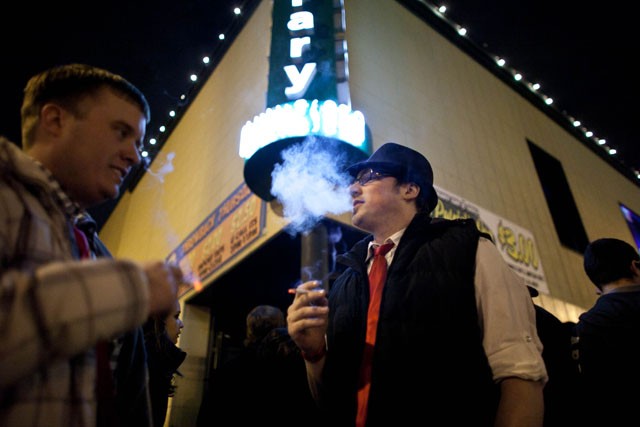Recent proposals in the Legislature would allow some bar and restaurant patrons to smoke indoors again, but there is little chance students will be able to do so in Dinkytown anytime soon.
The bill, introduced by Sen. Michael Jungbauer, R-East Bethel, at the end of January would allow smoking in certain sections of bars and restaurants for the first time since October 2007, when the Freedom to Breathe Act went into effect.
But critics of the bill have vowed to crush it, and former opponents of the smoking ban have gone quiet.
The bill and its companion in the House of Representatives have bipartisan support âÄî both Republicans and Democrats have signed on as co-authors of each bill.
If passed and signed, the bill would allow smoking in sections that are walled off from the rest of the establishment. Owners would have to install a ventilation system in these sections that brings in a fresh air supply every two hours.
Smoking would still be prohibited in the other areas of the bar or restaurant.
The bills are awaiting hearings in the Health and Human Services committees in their respective bodies. Jungbauer did not return multiple requests for an interview.
The American Cancer Society of Minnesota is gearing up to lobby against the bill in the coming months, state Government Relations Director Matt Schafer said. ACS lobbied on behalf of the smoking ban that passed three years ago.
The carcinogens in cigarette smoke are too fine to be removed by the ventilation systems, and the smoke will spread throughout an establishment regardless of separation, Schafer said.
“This would be like trying to designate a non-chlorine section in a pool,” he said.
Schafer also expressed concern about the billâÄôs deadlines for installing ventilation systems. The more alcohol that accounts for an establishmentâÄôs sales, the longer it has to install the system.
If alcohol makes up 40 percent of its gross sales, the deadline is July 2012. That deadline is July 2017 if alcohol accounts for more than 80 percent of sales.
After the FTB act was passed in 2007, the percentage of Minnesotans who reported being exposed to second-hand smoke dropped 12 percent to 45 percent in 2010, according to research from the Minnesota Department of Health.
The Minnesota Licensed Beverage Association was a staunch opponent of a smoking ban when the debate on that bill was ongoing.
But now, Executive Director Frank Ball said virtually none of the bars and restaurants that MLBA represents has asked him to fight for the proposed change in the legislature.
“Their places are clean, they smell good âÄî they donâÄôt have issues with [the smoking ban],” Ball said. “They would just as soon have this go away.”
The MLBA has played an integral role in shutting down the perennial attempt to keep Minnesota liquor stores open on Sundays. But when it comes to this bill, theyâÄôll be watching from the sidelines.
“It doesnâÄôt sound like itâÄôs going anywhere, but you never know,” Ball said.
The bars and restaurants around Dinkytown have shown little interest in opening their doors to patrons eager to smoke indoors again. In fact, many welcomed the smoking ban when it passed.
Health benefits outweighed any business trouble the ban may have caused, Andy Salmen, manager of the now-closed Dinkytowner Café, told the Minnesota Daily when the FTB act was instituted.
Under the bill, the decision to build a smoking area would be up to the owners of the bar. But Library Bar and Grill General Manager Joe Berg said he doesnâÄôt see the point.
“Outside kind of serves as the same thing, and itâÄôs not as expensive,” Berg said. “I just donâÄôt see the need for it.”
Blocks away at Downtime Bar and Grill on University Avenue, building the space required to allow smoking isnâÄôt even an option.
“We donâÄôt have the facilities for that,” Manager Chris Shaffner said.
Other bars on campus declined to comment or did not return interview requests.







